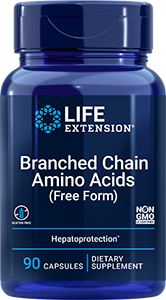
When to Take BCAA Supplements
Published: May 2022
Gym-goers, rejoice! BCAA supplements are here to make your fitness goals a reality—whether you've been dreaming of bigger gains or just want to recover faster from workouts, so you'll have the stamina to get back at it again the next day!
But this sports nutrition staple isn't only about athletic performance and muscle growth. BCAAs are a type of essential amino acid that support muscle protein synthesis, a process that's key to getting the most from each and every workout. Besides protein synthesis, BCAAs offer additional health benefits, making them a good supplement option for athletes and 9-to-5ers alike.
How can BCAAs help you, and how should you take them? Here's everything you need to know.
What are branched-chain amino acids (BCAAS)?
BCAAs are a group of essential amino acids (EAAs) that include leucine, isoleucine, and valine. Amino acids combine to form proteins, which are the building blocks of life. Quite literally, protein plays a role in every cell in your body. So, you need amino acids, which means that you need BCAAs.
We call these amino acids "branched-chain" because in a chemistry textbook, you'll notice that the side structure of leucine, isoleucine and valine is actually branched. Commonly, people use BCAAs as a sports nutrition supplement to help them support lean muscle and get stronger—although as you'll learn, there are other benefits.
You will find these amino acids in high-protein foods, including eggs, chicken, beef, beans and lentils, but BCAA supplements are a good way to make you're getting enough, especially if you have specific fitness goals.
What to know before taking BCAAs
Generally, BCAAs are safe to consume and well-tolerated. Bear in mind that branched-chain amino acids are a supplement. This means, by definition, that they are one piece of the puzzle when it comes to a healthy active lifestyle.
While BCAAs can help with fat loss and muscle gain, making them useful to people who have weight loss goals as well as those seeking to support healthy muscle mass, you still need to do the hard work of healthy nutrition and plenty of physical activity to see results. Think of these amino acids as your "workout buddy," making it just a little bit easier to go for one more rep.
What do BCAAs do? Health benefits
BCAA supplementation may offer a number of potential health benefits! Here are just a few.
1. Healthy muscle recovery after exercise
Research tells us that consuming BCAAs might help relieve minor stiffness and discomfort, along with healthy muscle recovery post-exercise. Furthermore, these are among several amino acids which can support overall muscle function.
What does this mean for you? Well, better muscle recovery means that in the days following a grueling workout, you could potentially feel better faster, and get back to the gym sooner. Lean muscles for the win! (L-arginine is another amino acid that could also help with this since it promotes healthy blood flow. This means that oxygen and nutrients are moving to the muscle tissues more efficiently, which could help with post-workout delayed onset minor discomfort.)
BCAAs and protein synthesis go hand in hand. This can work wonders for your body composition and athletic performance since protein intake is mandatory for supporting muscle mass.
2. More energy during workouts
We all know the feeling of hitting a workout hard… and then hitting your limit. Consuming a BCAA supplement pre-workout could help increase your time to exhaustion. In other words, you'll be able to work out for longer before needing to pause and rest, thus supporting your goals more easily.
Psst! If you're dealing specifically with a lack of energy, you might also benefit from other amino acid supplements. Try supplementing with taurine and glutamine, the latter of which can combat exercise fatigue. L-tyrosine can help with mental alertness and adjusting to stress, which your body definitely experiences during a workout.
3. Healthy immune function
Your immune system has a huge job to do. It protects your body from outside challenges. Studies suggest that BCAAs can contribute to supporting healthy immune cell function. This means branched-chain amino acids could help keep your immune system strong and fully functioning. Talk about a versatile amino acid!
While research is ongoing, based on what we know so far, BCAAs can be a powerful addition to a healthy diet.
4. Healthy muscles over time
It's not just about achieving healthy muscle mass. It's also about maintenance. One thing we all deal with as we age is a loss of muscle mass. Regardless of your activity level, BCAA supplementation could help. Once again, it has to do with muscle protein synthesis. Science tells us that BCAAs may inhibit age related muscle decline and help you keep enough healthy muscle tissue on your frame. Maintaining an appropriate muscle mass is going to help you sit, stand, and lift things. Muscles also help to pump blood through your body, and you need them even to breathe.
Explore Our Best Active Lifestyle & Fitness Supplements
How are BCAA supplements made?
Generally, BCAAs come from animal-based sources. They use parts of the animal that are higher in keratin—like the hair and hooves. However, branched-chain amino acids can also be plant-based, by fermenting plants like corn.
Who should take BCAA supplements?
Considering the benefits, these amino acid supplements can improve the health of just about anyone. However, because they promote muscle protein synthesis, they're especially beneficial for individuals who want to elevate their workouts, whether you're exercising at home or getting your sweat on at the local gym. If you're experiencing muscle soreness and fatigue post-workout, you might really enjoy incorporating BCAAs into your nutrition to encourage muscle recovery.
Do BCAA supplements work?
Yes! Many studies have demonstrated that BCAA supplementation can improve exercise performance and recovery. Further studies are ongoing.
Is it safe to take BCAA supplements every day? Dosages and risks
As we mentioned earlier, research says that BCAAs are safe and well-tolerated without side effects. Typical BCAA dosages range from 2 g up to 12 g per day. These amounts have been safely used in clinical studies.
We will always suggest that you defer to the label on the supplement you're taking to maintain healthy BCAA levels. Also, always consult with your healthcare provider before taking new supplements for the first time.
When should you take BCAAs for the best results?
Wondering when to take BCAAs? Most people will take their BCAAs pre-workout or post-workout. This comes down to personal preference—as both have been shown to have favorable outcomes. However, if you want more energy during your workout, you'll want to take BCAAs 30-60 minutes before. On the other hand, if muscle recovery is your primary goal, take it as you're doing your post-exercise stretching.
BCAA capsules vs powders
When it comes to picking your supplement, you have a couple of options. BCAA powder easily mixes into water or another beverage of choice. Some people opt for this if they have other powders they like to take before or after a workout, like protein powder. To build muscle protein in your diet is a must—and fortunately, Life Extension's Wellness Code® contains both whey protein and BCAAs! And in flavors including chocolate and vanilla, Wellness Code® is a good way to satisfy your sweet tooth. In fact, you can bake this protein powder into cookies, mix it into smoothies or even use it to make granola.
However, you can also opt for BCAA capsules, if you want something that's quicker to consume (or are following a low-calorie diet and don't need one more "treat," no matter how healthy it might be). Once again, this boils down to personal preference. Both should yield results.
Can you take BCAA and creatine?
For generally healthy individuals, there shouldn't be any issues or negative side effects with combining BCAAs and creatine. If you have any doubts, it's a good idea to speak with your doctor. Again, it doesn't matter so much if you use the combination as a pre-workout supplement, or you consume it post-exercise. It's going to help with your muscle gain and exercise performance all the same.
How to choose a high-quality BCAA supplement
When it comes to picking any supplement, there are a few things to look at. First, look at the overall credibility of the brand. Do they have a good reputation? Are there evidence-based studies showing that their formulas are effective? Are you able to find positive customer reviews from a number of different sources?
Also, look into how they source their ingredients. Where do they come from? How are they obtained? Do they undergo any third-party testing? If a brand is secretive about this, that could be a red flag. Transparency is key!
And lastly, listen to your body. You should feel happy and energized after taking your supplements. If you're experiencing negative side effects, pause and speak to your doctor so that you can reevaluate.
Diet and exercise are the first steps toward reaching your health and fitness goals. Supplementation is going to elevate your results further. Whether you're looking to kick your muscle mass up a notch, maintain what you already have, give your immune system a gentle nudge, or have more energy throughout the day, BCAAs might be able to help you!
References
- AbuMoh'd, Mohammad Fayiz et al. "Effects of Oral Branched-Chain Amino Acids (BCAAs) Intake on Muscular and Central Fatigue During an Incremental Exercise." Journal of Human Kinetics, March 2020, https://pubmed.ncbi.nlm.nih.gov/32269649/
- Arroyo-Cerezo, Alejandra et al. "Intake of branched chain amino acids favors post-exercise muscle recovery and may improve muscle function: optimal dosage regimens and consumption conditions." The Journal of sports medicine and physical fitness, February 2021, https://pubmed.ncbi.nlm.nih.gov/33586928/
- Bonvini, A. et al. "Immunomodulatory role of branched-chain amino acids." Nutrition Reviews, November 2018, https://pubmed.ncbi.nlm.nih.gov/30124936/
- Doma, Kenji et al. "The effect of branched-chain amino acid on muscle damage markers and performance following strenuous exercise: a systematic review and meta-analysis." Applied physiology, nutrition, and metabolism, October 2021, https://pubmed.ncbi.nlm.nih.gov/34612716/
- Ismaiel, Abdulrahman et al. "Effects of Branched-Chain Amino Acids on Parameters Evaluating Sarcopenia in Liver Cirrhosis: Systematic Review and Meta-Analysis." Frontiers in nutrition, January 2022, https://pubmed.ncbi.nlm.nih.gov/35155535/
- Khemtong, Chutimon et al. "Does Branched-Chain Amino Acids (BCAAs) Supplementation Attenuate Muscle Damage Markers and Soreness after Resistance Exercise in Trained Males? A Meta-Analysis of Randomized Controlled Trials." Nutrients, May 2021, https://pubmed.ncbi.nlm.nih.gov/34072718/
- "L-arginine." Mayo Clinic, February 2021, https://www.mayoclinic.org/drugs-supplements-l-arginine/art-20364681







